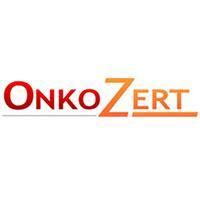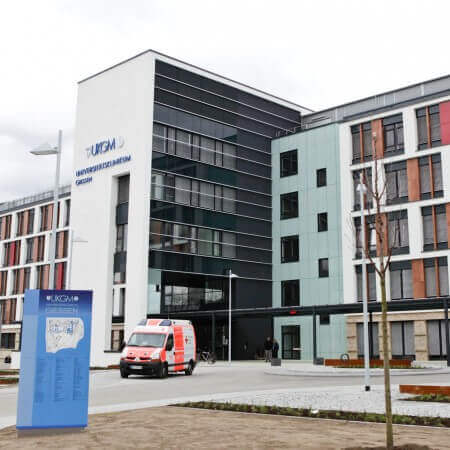Pancreatic Cancer — Proton Therapy: treatment in the Best Hospitals in the World
Treatment prices are regulated by national law of the corresponding countries, but can also include additional hospital coefficients. In order to receive the individual cost calculation, please send us the request and medical records.

Department of Adult and Pediatric Proton Therapy
The Department of Adult and Pediatric Proton Therapy offers the full range of proton treatment and it is one of the leading and most progressive medical facilities of this kind not only in Germany, but throughout the world. The proton therapy is mostly used for the treatment of tumors of the eye, brain, spine and pelvic organs. Also, the proton therapy is an excellent treatment of tumors in children, since it has a minimal negative effect on the immature, sensitive tissues of the child’s body.







National Center for Tumor Diseases (NCT) Heidelberg
The National Center for Tumor Diseases (NCT) Heidelberg offers the full range of diagnostics and treatment of various oncological diseases. Since its foundation in 2004, the center has gained a reputation of one of the leading in Germany. The center is supported by the German Cancer Research Center (DKFZ) and the German Cancer Aid (Deutschen Krebshilfe). The center treats about 60,000 patients from 45 countries every year. Thanks to the outstanding research activities, the department has the very latest therapeutic opportunities that save lives for thousands of people.


Proton Therapy Center
The Proton Therapy Center specializes in an innovative type of radiation therapy for children, namely proton therapy. The medical facility is one of four centers in Germany offering proton therapy for cancer treatment in young patients. The center has been working since October 2015 in close cooperation with the Marburg Ion Beam Therapy Center and today can boast exceptional clinical experience in the field of its competence. Proton therapy is significantly superior to conventional radiation therapy in terms of dose control, dose distribution and side effect profile. Thus, it is an excellent alternative form of cancer treatment. The main advantage of proton therapy is that it has potentially fewer immediate and long-term side effects as compared to classical radiation therapy. The harmful effects on healthy tissues during proton therapy are minimized, which is especially important for children, as their brain and body are in the growth phase. In addition, proton therapy is provided on an outpatient basis and is an absolutely painless treatment, which is also important for young patients.

Proton therapy is an innovative method of irradiation for malignant tumors characterized by a low risk of post-radiation complications. Safety is especially important when irradiating pancreatic neoplasms, as the pancreas is surrounded by a large number of radiation-sensitive organs. If proton therapy is still not used in your country, it is expensive, or you have to wait a long time for treatment, you can go abroad. In Europe, you can get better quality of treatment, while the therapy will be faster and cheaper.
Content
- What is a difference between protons and photons
- In what situations can radiation therapy be used
- Proton therapy for unresectable cancer
- Proton therapy before surgery
- Proton therapy after surgery
- Conclusions: why are protons better than photons
- Why is it worth treating oncological diseases abroad
- Treatment in Europe with Booking Health at an affordable price
What is a difference between protons and photons
Conventional radiation therapy uses photons. This is the main treatment option in oncology using radiation. In recent years, photon radiation therapy has been improving: it is becoming more accurate and safe. The introduction of the beams is synchronized with the patient's breathing. Radiation therapy is conducted under image guidance, usually using MRI. The beams are directed into the body at different angles to minimize the dose of radiation to healthy tissues.
Despite all the advances in radiation oncology, radiation treatment for pancreatic cancer is still unsafe. The problem is that there are a lot of radiosensitive healthy tissues around the organ. These are the duodenum, stomach, jejunum, liver and kidneys. They are inevitably damaged by radiation with the development of post-radiation complications. As a result, doctors cannot use high doses of radiation to suppress pancreatic tumors, and low doses cannot provide good results.
The problem with photons is that they release a lot of radiation even before reaching the target. Protons do not have this disadvantage. When moving to the tumor, they lose a minimum of energy. They release radiation with penetration into the tumor. Further, the tissues adjacent to the tumor are not irradiated at all.
Thus, in pancreatic cancer, protons can achieve one of two goals:
- Deliver the same dose of radiation to the tumor, but more safely, reducing the risk of complications.
- Deliver a higher dose of radiation without increasing the risk of post-radiation complications.
In what situations can radiation therapy be used
The role of radiation therapy in the treatment of pancreatic cancer is a constant subject of discussion. It is currently used in the following cases:
- After surgery, to reduce the risk of recurrence of the disease.
- Instead of surgery, with unresectable tumors.
Typically, radiation for patients with pancreatic cancer is combined with chemotherapy. Nonetheless, there are more and more publications in which radiation therapy is criticized: it is too dangerous, as it often causes complications. At the same time, compared to patients who receive chemotherapy alone, the increase in survival rates is insignificant.
What's more, the results of a study by the European Study Group of Pancreatic Cancer suggest that postoperative photon radiation therapy not only does not improve the patient's survival, but may decrease it, presumably due to the toxicity of radiation therapy.
The use of proton therapy instead of photon therapy may improve the benefit-risk ratio in the treatment of pancreatic cancer, since this radiation option is safer.
Proton therapy for unresectable cancer
The effectiveness of proton beam therapy for cancer has been repeatedly confirmed in studies, both dosimetric and clinical. Its advantages over photon irradiation are beyond doubt. Only the high price hinders the widespread introduction of protons.
A study by Hsiung-Stripp et al showed that protons in pancreatic cancer help reduce radiation exposure to the spinal cord, liver, and both kidneys. The authors concluded that it is possible to safely increase the dose of radiation in order to obtain the best therapeutic outcomes.
Bouchard et al compared IMRT (intensity modulated radiation therapy) and proton therapy. It turned out that with the help of protons it is possible to deliver more than 70 Gy of radiation to inoperable tumors.
Researchers from the University of Florida provided treatment to 22 patients. The radiation doses were quite high: from 50 to 60 Gy. In addition, chemotherapy was used. Despite this, none of the patients developed toxicity grade 3 or higher.
The same group of scientists later published a study involving 11 patients with inoperable pancreatic cancer. They were treated with chemotherapy and protons. None developed toxicity beyond grade 3. There were no cases of grade 2 gastrointestinal toxicity. Only 31% of the patients had a local or regional tumor recurrence within 2 years of observation, which can be considered an excellent result with such an aggressive tumor as pancreatic cancer. In 4 out of 11 patients in whom the tumor was initially inoperable, it decreased to a resectable state.
Proton therapy before surgery
Pancreatic cancer is often initially unresectable, but after neoadjuvant treatment, the tumor can be removed. The performance of a radical surgical intervention is the only way for a patient to be completely cured of cancer. All other techniques only allow for some time to suppress the tumor growth, thus increasing the life expectancy of the patients with cancer.
Kathryn E Hitchcock, R Charles Nichols treated 15 patients with inoperable pancreatic cancer using protons and chemotherapy. As a result, in 6 of them, the tumor had shrunk so much that doctors performed a surgical intervention to remove it. In 5 cases, the surgical procedure was successful. In another case, the operation had to be interrupted because the surgeons discovered that the cancer had spread to the peritoneum.
Such results became possible due to the delivery of high doses of radiation to the tumor, almost 60 Gy. Doctors would not be able to irradiate a neoplasm with the same doses using photons.
Proton therapy is used with chemotherapy and resectable neoplasms. The main goal is to reduce the risk of local and regional recurrence. Doctors irradiate the tumor with small doses of radiation – 25 Gy. After 10 days, surgery is performed. The same can be done with photons, but the advantage of protons is safety. Only 4% of patients develop toxic reactions of grade 3 and higher.
Proton therapy after surgery
Only 20% of patients suffering from pancreatic cancer receive treatment. The best results are achieved if signs of the tumor are not found either in the lymph nodes or at the edges of the resection (at the border of the removed tissue). But even in this case adjuvant (postoperative) treatment is required. Despite its provision, 30% of patients develop cancer recurrence. If cancer cells are found in the lymph nodes or at the tumor border, then the risk of recurrence reaches 60-80%.
The problem with radiation after surgery is that:
- It can be performed only after the patient has recovered, that is, not earlier than after 10 weeks.
- The bowel is shifted, and therefore it is difficult to deliver the required dose of radiation without damaging it.
- The small intestine tolerates radiation very poorly, so doctors cannot deliver more than 50 Gy to the target using photons.
Nonetheless, with the help of protons, the radiation dose can be increased. If it remains the same, then the treatment at least becomes less toxic. Nichols et al compared the toxicity of IMRT and proton therapy at a dose of 50 Gy. The load on the bowel, stomach and kidneys was much lower.
Conclusions: why are protons better than photons
Proton therapy is undoubtedly a better radiation option than conventional photon radiation therapy. Research shows the following benefits:
- Reduced risk of local and regional (from the lymph nodes) recurrence of the tumor after removal.
- The tumor can reach a resectable state, even if at the time of diagnosis it is believed that the cancer cannot be removed.
- Significant increase in the patient's survival.
- Lower risk of side effects than with photon therapy for cancer.
The toxicity of radiation therapy, especially when combined with chemotherapy, is very high. However, health risks can be reduced by using protons.
Proton therapy is the treatment option that is effective even for inoperable tumors. By themselves, protons cannot completely destroy a neoplasm with radiation, but in many patients cancer becomes operable. As a result, it can be removed later. Some authors in their publications call such treatment outcomes unexpected.
In modern medicine, protons can be used more and more often than photons. It is a safe way to deliver radiation to the tumor. In pancreatic cancer, protons have been used for decades, but it is only in recent years that a sufficient number of proton therapy centers have appeared for this treatment option to be applied en masse. A growing body of research is emerging to support the benefits of this treatment option.
Not only safety for health, but also higher efficiency are among the advantages of proton therapy. The best results in pancreatic cancer treatment are obtained by increasing the dose of radiation. The delivery of such high doses to the tumor is impossible using photons due to unacceptable toxicity.
Why is it worth treating oncological diseases abroad
In case of the development of cancer, including pancreatic cancer, you can travel abroad and visit one of the countries with developed medicine. The treatment here is safe and effective. The countries with advanced medicine offer the latest technologies, including proton therapy.
This method of treatment is far from being used everywhere. Even if it is used in your country, then you may face the following problems:
Proton therapy is not available. There are other cancers in which protons are used more often than for pancreatic cancer. For example, these are brain tumors in children or neoplasms of the base of the skull. The patients with these conditions are usually given priority as they benefit most from using protons instead of photons. Therefore, you may be refused treatment of pancreatic cancer.
Insufficient experience in the treatment of pancreatic cancer. We will select a center for you abroad, whose doctors specialize in proton therapy for this pathology.
New technologies. In countries with advanced medicine, imaging is better for accurately targeting protons to the tumor. Some centers conduct intensity modulated proton therapy, which is even safer, capable of irradiating complex neoplasms located near functionally important organs.
High price. Proton therapy is the most expensive in Japan and North America. It is cheaper in Western Europe. In Eastern Europe, the prices are even lower. Although the level of medicine is lower here, proton therapy centers are relatively new, so doctors use new equipment and cutting-edge technologies to irradiate patients with pancreatic cancer.
Long waiting time. It may be that there are not enough medical resources in your country to be able to receive radiation therapy for pancreatic cancer in the very near future. Waiting for a long time for the procedure may cause the tumor to progress and the treatment will become less effective. We will help you find a hospital in Europe where proton therapy will be available in the coming days.
Treatment in Europe with Booking Health at an affordable price
To undergo proton therapy for pancreatic cancer in one of the European hospitals, please use the services of the Booking Health company. On our website, you can find out the cost of treatment in different hospitals, compare prices and book a medical care program at a favorable price. The cost of proton therapy for pancreatic cancer is between 85,600 EUR and 86,200 EUR. Proton therapy for pancreatic cancer in a European hospital will be easier and faster for you, and the cost of treatment will be lower.
Please leave your request on the Booking Health website. Our employee will contact you and provide consultation about treatment in Europe. Booking Health will take care of the organization of your trip. We will provide the following benefits for you:
- We will select a hospital for treatment in Europe, whose doctors use proton therapy for pancreatic cancer.
- We will solve the problem of the language barrier, establish communication with your attending physician.
- We will reduce the waiting time for the start of the medical care program and book a doctor's appointment on the most suitable dates.
- We will reduce the price. The cost of treatment in European hospitals will be lower due to the lack of additional coefficients for foreign patients.
- We will take care of all organizational issues: documents for entering the country, transfer from the airport, hotel, interpreting services, etc.
- We will prepare a program and translate medical documents. You do not have to repeat the previously performed diagnostic procedures.
- We will help you keep in touch with the hospital after treatment in Europe.
- We will organize additional diagnostic examinations and treatment in a European hospital, if necessary.
- We will buy medicines abroad and forward them to your native country.
- We will help you keep in touch with the hospital and the doctor after treatment in Europe.
You will receive treatment from the best doctors in the world. The Booking Health employees will help reduce the cost of treatment and take care of all organizational issues, and you will only have to focus on restoring your health.
Authors: Dr. Nadezhda Ivanisova, Dr. Sergey Pashchenko

